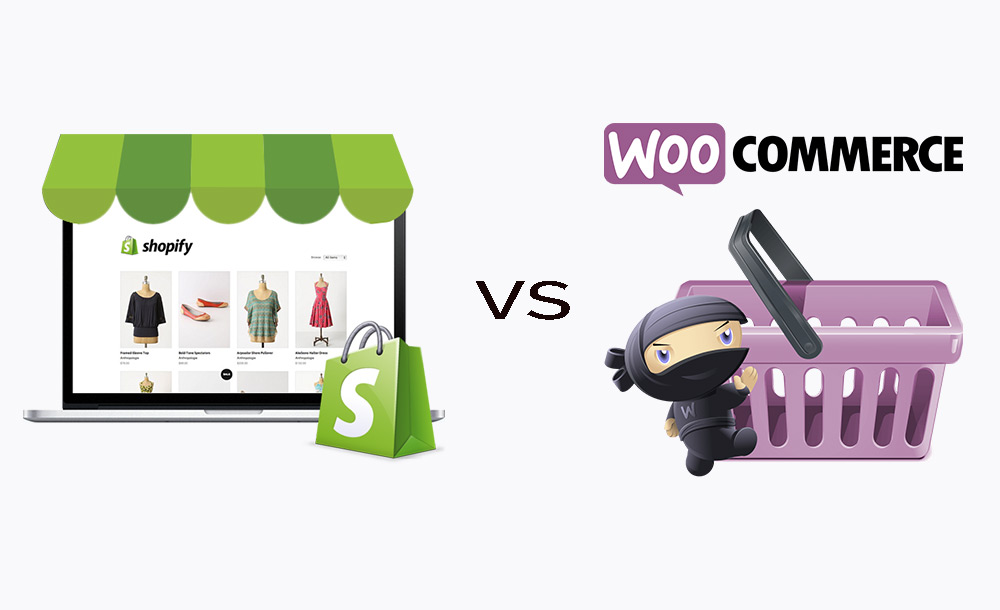Shopify vs WooCommerce, which is best for you?
Thinking about setting up an online store? the question of Shopify vs WooCommerce comes up often – It’s definitely a tough decision:
This article will appeal to those of you who are looking for a solution for small eCommerce stores. Here’s a comparison between Shopify and WooCommerce. Which platform is better? As is often the case in life, everything depends on your company’s needs.
Since this is a detailed Shopify vs WooCommerce comparison, here’s a quick table of contents:
- Overview: Shopify vs WooCommerce
- What do you need to start a store?
- Flexibility and adaptability
- Payment methods
- Data protection and security
- Detailed comparison
- Sales features
- SEO features
- Conclusion: WooCommerce vs Shopify
ePresence is a professional E-commerce Development agency based in Cork that proudly serves companies throughout Ireland.
Contact Us for your eCommerce needs
Overview: Shopify vs WooCommerce
And how does WooCommerce compare to Shopify? You’ll find out soon enough. WooCommerce is in second place in the popularity rankings of eCommerce platforms. Nothing unusual. WooCommerce is an eCommerce plugin for WordPress, and this CMS needs no introduction. When to choose WooCommerce and when to choose Shopify? We will answer this question in today’s article.
What is Shopify?
Shopify is an eCommerce platform for small and medium-sized online stores that supports the sales process from stocking the product, through secure payments, to its shipment. You don’t have to worry about the technical aspects of website management like hosting, security, cache, etc. The platform is used by over 1,700,000 companies around the world.
What is WooCommerce?
The world’s most popular eCommerce platform, WooCommerce is also the most popular among our customers. What we value the most in it is the unlimited expansion possibilities, as well as a friendly and intuitive CMS panel. Novice specialists have no problems with implementation and configuration. WooCommerce has wide access to various types of plugins. There are a lot of technical guides available on the web and in the WordPress community.
What do you need to start a store?
The first difference between Shopify and WooCommerce is visible at the time of setting up the store. WooCommerce is a plugin for WordPress, to start selling online with its help, you need to install WordPress, and purchase hosting and your own domain. Setting up a store is very simple, and there are many guides on the Internet on this subject. The WordPress plugin – WooCommerce has many enthusiasts.
Immediately after uploading the WooCommerce plugin to WordPress, you need to configure the store. In WooCommerce > Settings you will configure basic information, i.e. select the store currency, enter the store address, add products and upload integration with shipping and payment systems, and add marketing plugins and plugins that will help you issue invoices to customers. The advantage of WooCommerce is that you can freely expand this plugin, use it and customise it for various purposes. You can create a place for members, set up a store with additional B2B features for sellers or work with product configurators to offer individual solutions or projects.
What do you need to start a Shopify store? Shopify is a turnkey solution. Unlike WooCommerce, you don’t need hosting or a domain, but you can connect your own domain because the free one ends with myshopify.com. After creating an account, you have access to the sales platform and, just like in WooCommerce, right after logging in, it’s time to complete the basic information, add products, customise the template and upload the integration. Everything is straightforward. It doesn’t get any easier than getting started with Shopify. The shop opening is intuitive and the configuration is straightforward. With Shopify, you have a simple store in record time with which you can sell your first products.
Conclusion:
Both Shopify and WooCommerce have a very clear configuration process, and online shops are set up very quickly. WooCommerce is a plugin for WordPress. For this reason, in order to start selling, we need to install WordPress on the domain we have purchased. Shopify has its own hosting. To start selling, we need to configure the store.
Flexibility and adaptability
How flexible are the design and function customisation options? With WooCommerce you have 100 percent freedom when it comes to customization. The shop can therefore be designed completely individually using the WooCommerce themes. There are virtually no limits to flexibility and functionality.
With WooCommerce, you can not only sell simple products but also create a member area where you can run video courses or sell individual handicrafts using the product builder on the site. You can also optimise your website for search engines (SEO) – so that it is better found on Google. There are ready-made extensions (plugins) for many things, which are often free.
Half of the success of a WooCommerce store depends on hosting. If you have good hosting then the store will load fast. Shopify doesn’t have this problem because Shopify makes sure that the seller is guaranteed to be reliable. The platform does not want to lose a customer.
Shopify is an eCommerce platform that releases new features all the time. By logging in to the admin panel for the first time, you will quickly connect all the functionalities you need to start selling and bring traffic to the website. Shopify has built-in integrations with Social Media sales channels.
What’s more, you can connect Shopify with ad accounts, e.g. Google, and run campaigns from Shopify. You can quickly add regulations, translate the store into another language and launch additional functionalities that will give you full control over marketing, sales and customer service. Shopify has a built-in abandoned cart automation system.
What about the appearance of the shops? There are many plugins and themes (some of which you have to pay for) that you can use in your store. Shopify has some of the prettiest eCommerce templates. The templates are fully editable, responsive and meticulously tested for conversion optimization.
Payment methods
Shopify offers many payment options and also has its own payment solution called Shopify Payments (powered by Stripe). The standard fee of 2.2% is not added to this payment method.
The problem is that Shopify charges this additional fee for every transaction made through third-party payment gateways. This is in addition to the transaction fees charged by the payment gateway.
The most well-known payment gateways on Shopify are PayPal, Stripe, WorldPay, Klarna, Square and Amazon Pay.
As part of the basic settings, the WooCommerce plugin allows you to configure several payment methods, including traditional transfer, payment by check, credit card and PayPal.
The most popular payment gateway is Stripe. It is also compatible with all other popular payment providers via plugins. The payment gateways charge transaction fees.
Data protection and security
With WooCommerce, you are 100% the owner of your data and that of your customers. Only you decide what happens to them and where they are stored. Therefore, all responsibility rests with you. For example, you need to make sure your WordPress installation is secured.
Shopify gives you the ability to export your customer data. However, the website always keeps its own copy of all data on its servers. Shopify claims to take care of all security issues.
Detailed comparison of Shopify vs WooCommerce
| Shopify | WooCommerce | |
|---|---|---|
| Price | €32 / €92 / €384 mo | Free |
| Omnichannel features | YES | YES |
| Individual IP address | YES | YES |
| Integration with accounting systems | YES | YES |
| Active installations | Over 1 800 000 | 5+ million |
| Service model | SaaS | Open Source |
| Blog | YES | YES |
| Social media sharing | YES | YES |
| Implementation of promotions and discounts | YES | YES |
| Implementation of changes | Partly standalone (some changes must be made by the developer or can be implemented by additional applications) | You can implement yourself |
Sales features
| Shopify | WooCommerce | |
|---|---|---|
| SSL certificate | YES free | YES |
| Hosting included | YES | NO |
| Integration with payment systems | YES | YES |
| Shipping Cost Calculator | YES | YES |
| Bulk product listing | YES | YES |
| Sell virtual products | YES | YES |
| Abandoned cart recovery | YES | YES |
| Product variations | YES | YES |
| Technical Support | YES 24/7 | NO |
| Search and filtering | YES | YES |
| Returns management | YES – via a paid application Free only generate a refund |
YES |
Shopify vs WooCommerce which is best for SEO
| Shopify | WooCommerce | |
|---|---|---|
| Automatic sitemap | YES | YES |
| Automatic canonical tags | YES | YES |
| Automatic 301 redirects after URL change | NO | YES |
| Editing URLs | Yes – but only ‘handle’ parts (e.g. product name) | YES |
| Editing the robots.txt file | Partially | YES |
| Title edit | YES | YES |
| Mobile friendly | YES | YES |
| Product review module | YES | YES |
| Possibility to edit the 404 page | YES | YES |
| The ability to work on page speed in the CMS panel | Dependent on optimisation scope | YES |
| Possibility of assigning one product to several categories – elimination of content duplication | YES | YES |
| Simple and quick rebuild of the structure | YES | YES |
| Blog | YES | YES |
| Assigning one subcategory in several places in the menu | YES | YES |
| Ease of work on SEO | YES | YES |
| Manual 301 redirects | YES | YES |
| Setting no index on categories, products, pages | YES | YES |
| Implementation of structured data (schema markup) | Yes – by code or application | YES |
| Internal search engine | YES | YES |
| Own domain | YES | YES |
| Possibilities of advanced technical changes | YES | YES |
Conclusion: WooCommerce vs Shopify
Shopify is designed for people who want to set up an online store in the simplest and quickest possible way, without having a lot of technical knowledge. And where they sell simple, standard shipping products. With Shopify, you don’t have to worry about a thing and can get up and running in the fastest time. Shopify pays for platform development and hosting through fees. More sales and turnover means more fees.
WooCommerce is for all! And for all cases where you need more than a small store. WooCommerce is perfect for everyone who wants to have their own store. And who is not afraid to learn more or is looking for a service provider for this purpose?
On WooCommerce, you should not shy away from technology. At the same time, you must be willing to acquire new knowledge. An interest in online technologies is essential, as well as a willingness to take responsibility for the security of the store.
Interested in learning more about eCommerce then why not check out our article on Improving your eCommerce Conversion Rates or our top 22 Tips for Effective eCommerce?
Contact Us for your eCommerce requirements.
*Details, specifications and prices were accurate at the time of publishing






